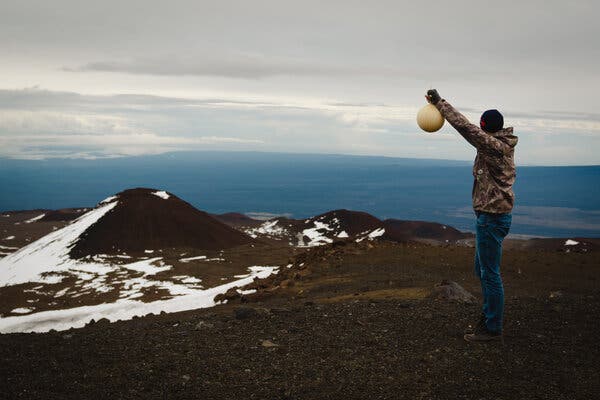More from our inbox:
- Vietnam-Era Exiles From the U.S.
- Drugs and Tariffs

A National Oceanic and Atmospheric Administration technician collecting air samples on Mauna Kea, Hawaii, in 2023.Credit…Erin Schaff/The New York Times
To the Editor:
Re “Trump Expels Scientists Working on Climate Report for 2028” (news article, April 30):
I’m 73 years old. If there were a scientific test — or a crystal ball — that could tell me when I will die and what major precautions I could have taken to suffer less before I die, would I want to know?
Maybe not.
But for our grandchildren’s future health? The answer is “yes.”
One of President Trump’s mantras remains “drill, baby, drill” — for more petroleum to be burned to further pollute and degrade the climate, the environment and human lungs.
Now the president has dismissed hundreds of volunteer scientists and other experts who compile data to create the National Climate Assessment, as mandated by Congress.
We’ll see whether Republican members of Congress stop Mr. Trump’s anti-science crusade or continue putting their heads in the sand. Because unless they act immediately to begin reversing man-made climate change, there’s going to be a lot more sand — for all of us.
Reggie Regrut
Phillipsburg N.J.
To the Editor:
The Trump administration recently dismissed hundreds of scientists volunteering their time and expertise to produce the next National Climate Assessment, the most trustworthy and comprehensive source of information about how global warming is affecting the United States.
A changing climate, a changing world
Climate change around the world: In “Postcards From a World on Fire,” 193 stories from individual countries show how climate change is reshaping reality everywhere, from dying coral reefs in Fiji to disappearing oases in Morocco and far, far beyond.
The role of our leaders: Writing at the end of 2020, Al Gore, the 45th vice president of the United States, found reasons for optimism in the Biden presidency, a feeling perhaps borne out by the passing of major climate legislation. That doesn’t mean there haven’t been criticisms. For example, Charles Harvey and Kurt House argue that subsidies for climate capture technology will ultimately be a waste.
The worst climate risks, mapped: In this feature, select a country, and we’ll break down the climate hazards it faces. In the case of America, our maps, developed with experts, show where extreme heat is causing the most deaths.
What people can do: Justin Gillis and Hal Harvey describe the types of local activism that might be needed, while Saul Griffith points to how Australia shows the way on rooftop solar. Meanwhile, small changes at the office might be one good way to cut significant emissions, writes Carlos Gamarra.
Imagine being a passenger on a ship journeying across the North Atlantic in springtime and learning that the captain had just dismissed all lookouts because he refuses to believe the overwhelming evidence of the existence of icebergs.
